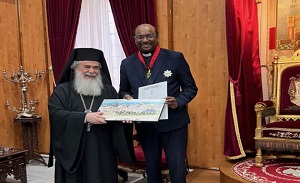World churches group leader visits Holy Land to strengthen call for just peace

The Geneva-based WCC said in a statement that its member churches, religious leaders, and local Christian groups in Palestine and Israel were meeting with the council's general secretary, Rev. Jerry Pillay.
The visit began on Feb. 16, and Pillay will also meet Palestinian president Mahmoud Abbas and Israeli head of state Isaac Herzog during his visit.
Pillay's visit was his first to Palestine and Israel since he became the WCC general secretary one year ago.
The agenda in the Holy Land opens with a meeting with the Patriarchs and Heads of Churches in Jerusalem.
Pillay attended a Sunday service at a local church.
He met with various religious, social, and political leaders and visited the WCC Jerusalem Liaison Office.
The WCC head met with the patriarchs and heads of churches in Jerusalem on Feb. 17.
He was received with gratitude "at this difficult and complicated time for all the peoples of this region, and especially for the Christian community of the Holy Land," said Theophilos III, Patriarch of Jerusalem, in a welcome address.
"Your visit is of such importance, for you bring with you the attention of the World Council of Churches and its members to the situation here," said Theophilos III. "War and violence are always the consequence of human failure."
'DIFFERENT TRUTH'
The church proclaims a different truth, the patriarch said.
"In theological terms, we affirm that hatred and darkness have no hypostasis; it is only light and life that have a true and enduring existence," he said. "Death is not our mission."
The patriarch called for unity, peace, and reconciliation. "This is our common human vocation and our common human destiny," he said. "Our historical experience in the Holy Land is a powerful and tangible example that synagogue, church, and mosque may exist side-by-side in mutual respect."
One of the programs WCC runs in the Holy Land is to send "accompaniers" to witness life under occupation in the Holy Land.
Recently, six ecumenical accompaniers returned to Palestine and Israel, resuming in-person operations for the WCC's "Ecumenical Accompaniment Programme in Palestine and Israel."
Ecumenical accompaniers were evacuated at the beginning of October 2023 and had continued their support and accompaniment online.
The WCC said, "The Ecumenical Accompaniment Program in Palestine and Israel modified its strategy in response to the intensifying crisis in Gaza, moving to distant activities while keeping its commitment to vulnerable communities."
TACTICAL CHANGE
It said, "This tactical change ensured that the impacted communities are empowered, and their voices are heard."
The WCC said that Jerusalem is the primary location for the physical presence of ecumenical accompaniers.
Accompaniers continue to support other regions remotely, collaborating with various organizations and ensuring comprehensive coverage and assistance.
"The Ecumenical Accompaniment Programme in Palestine and Israel remains committed to providing support and advocating for justice and peace in the region," said Carla Khijoyan, WCC program executive for the Middle East.
"The program emphasizes the importance of impartiality and nonviolence in its operations and aims to contribute towards a future of coexistence and mutual respect between Palestinians and Israelis."
The Ecumenical Accompaniment Program for Palestine and Israel, which the WCC initiated, brings international volunteers to the West Bank to witness life under Israel's occupation and support local communities.
The WCC represents more than 500 million Christians worldwide in more than 110 countries, mainly from Anglican, Orthodox, and Protestant traditions, and has its main office in Switzerland.
Christians represent a tiny minority in Gaza.
During the current Gaza conflict, a deadly explosion at the al-Ahli Arab Hospital on October 17 killed close to 500 people, according to Palestinian health authorities, Al Jazeera news reported.
Two days later, Israel bombed the Church of Saint Porphyrius, the Gaza Strip's oldest church, killing at least 18 people, according to Al Jazeera news.
The deadly attacks on the hospital — an Anglican institution — and the church brought into sharp focus the enclave's embattled Christian minority, Al Jazeera reported.
It said the Orthodox Patriarchate of Jerusalem described the attack on the church as a "war crime."
The Christian community was left reeling, yet most have not left the besieged city, which lays claim to a rich seam of Christian heritage going back two millennia.
The number of Christians in Gaza has dwindled in recent years. Today, there are only approximately 1,000 left, a sharp drop from the 3,000 registered in 2007 when Hamas assumed complete control over the enclave next to Israel.
Al Jazeera quoted Kamel Ayyad, a Church of Saint Porphyrius spokesperson, saying that most of the population is from Gaza itself.
The rest fled there in 1948 after the creation of the state of Israel, which displaced about 700,000 Palestinians.
Source: https://www.ecumenicalnews.com/

